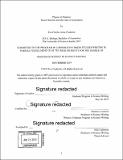| dc.contributor.advisor | Thomas Levenson. | en_US |
| dc.contributor.author | Frederick, Eva Charles Anna. | en_US |
| dc.contributor.other | Massachusetts Institute of Technology. Department of Comparative Media Studies. | en_US |
| dc.contributor.other | Massachusetts Institute of Technology. Graduate Program in Science Writing. | en_US |
| dc.date.accessioned | 2020-02-10T22:51:35Z | |
| dc.date.available | 2020-02-10T22:51:35Z | |
| dc.date.copyright | 2019 | en_US |
| dc.date.issued | 2019 | en_US |
| dc.identifier.uri | https://hdl.handle.net/1721.1/123783 | |
| dc.description | Thesis: S.M. in Science Writing, Massachusetts Institute of Technology, Department of Comparative Media Studies/Writing, 2019 | en_US |
| dc.description | Cataloged from PDF version of thesis. | en_US |
| dc.description | Includes bibliographical references (pages 25-26). | en_US |
| dc.description.abstract | In November of 2017, a group of researchers published a paper showing that since the 1980s, insect populations in protected areas in Germany have decreased by over 75 percent. The decline, dubbed by one reporter the "insect armageddon," was widespread, affecting sites on nature reserves across the country. It was also indiscriminate, affecting not just certain species, but overall biomass. In the following years, similar studies from Greenland, Puerto Rico, and locations in North America have also shown declines in number of insect species, abundance, and habitat. These declines have serious implications for ecosystems and for humans, some of which we can already see in effect, and some that scientists can't even predict to their full extent. This thesis will profile a research team in Costa Rica who are using caterpillar-parasitoid interactions to make estimates about insect population health, and explore the reasons for and extent of insect declines and their consequences for humans. | en_US |
| dc.description.statementofresponsibility | by Eva Charles Anna Frederick. | en_US |
| dc.format.extent | 26 pages | en_US |
| dc.language.iso | eng | en_US |
| dc.publisher | Massachusetts Institute of Technology | en_US |
| dc.rights | MIT theses are protected by copyright. They may be viewed, downloaded, or printed from this source but further reproduction or distribution in any format is prohibited without written permission. | en_US |
| dc.rights.uri | http://dspace.mit.edu/handle/1721.1/7582 | en_US |
| dc.subject | Comparative Media Studies. | en_US |
| dc.subject | Graduate Program in Science Writing. | en_US |
| dc.title | Plague of absence : insect declines and the fate of ecosystems | en_US |
| dc.title.alternative | Insect declines and the fate of ecosystems | en_US |
| dc.type | Thesis | en_US |
| dc.description.degree | S.M. in Science Writing | en_US |
| dc.contributor.department | Massachusetts Institute of Technology. Program in Comparative Media Studies/Writing | |
| dc.identifier.oclc | 1138991051 | en_US |
| dc.description.collection | S.M.inScienceWriting Massachusetts Institute of Technology, Department of Comparative Media Studies/Writing | en_US |
| dspace.imported | 2020-02-10T22:51:34Z | en_US |
| mit.thesis.degree | Master | en_US |
| mit.thesis.department | CMSW | en_US |
